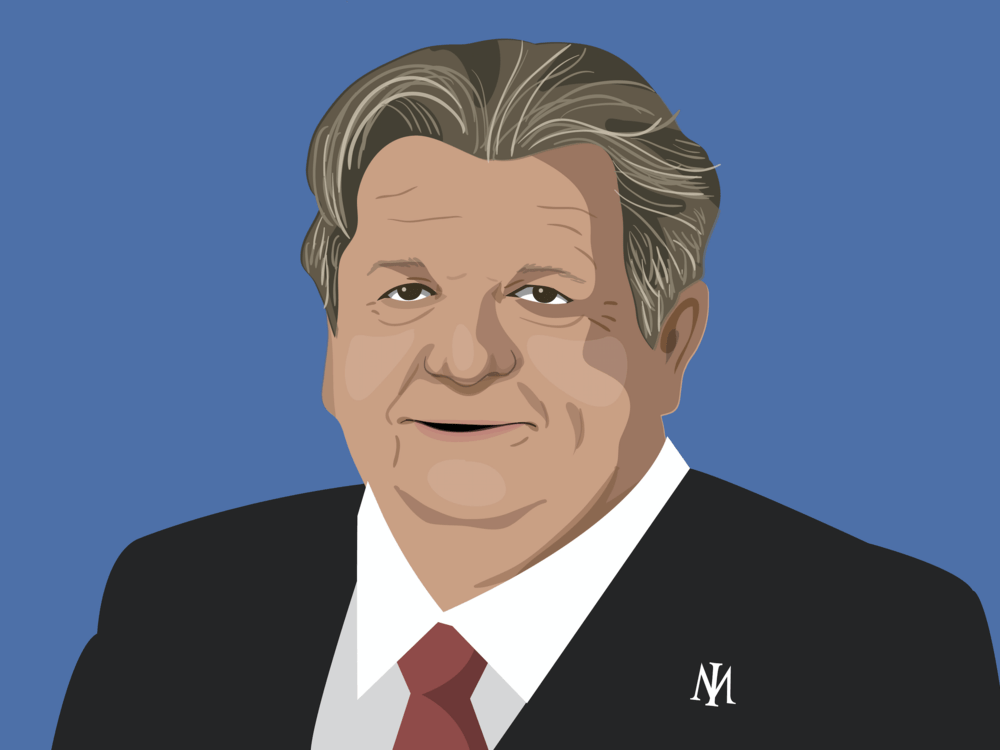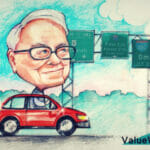True Rags to Riches stories are actually few and far between. We often hear of the biggies; the Jeff Bezos’ story, the Bill Gates story, the Steve Jobs’ story or even Warren Buffett’s history. The thing that is common among most of the ones we know is that they tend to be tech gurus or famous investors. They’ve all built companies that are the envy of the world and become famous along the way. But how often do you hear about a guy who only went to high school, was given a junkyard, and was able to turn it into a multi-billion dollar company? Not often, I bet.
Q1 2020 hedge fund letters, conferences and more
Willis Johnson’s incredible story is a rag-to-riches tale of a budding young American entrepreneur who scrapped and saved, kept trying new things and ultimately turned a small auto junkyard into a multi-billion dollar business. An investment in Willis’ Copart in 1994 has been a veritable 150-bagger!!
Johnson tells the story of Copart in his 2014 auto-biography ‘Junk to Gold’. An easy read, it contains a wealth of business wisdom and life lessons. Johnson’s passion for wheeling & dealing emerged while buying, dismantling and selling old cars as a teenager with his entrepreneurial father. It also tells how he was conscripted to the US Army and did a tour of duty in Vietnam where only half his unit survived, how he also earned a Purple Heart and some new skills to apply to the dismantling yard he purchased on his return. With his newly acquired junkyard, Johnson strived for growth.
In the words of Charlie Munger, Johnson is a ‘Talented Fanatic’ who disdained standard industry practice. Instead, he introduced clean and organised stores that more closely resembled a retail store than the typical ‘bunch of wrecked cars in a field’. He was the first to dismantle not just cars, but parts, which he refurbished for sale. Introducing an industry catalogue and improving customer communications made him a valued partner to customers.
Like Charles Schwab at Schwab Corporation, Willis wasn’t afraid to embrace new technology if it meant increased efficiency and improved customer service. It also provided a jump on competitors. In Sam Walton style, Willis unashamedly copied ideas from everywhere: competitors, other industries; even Disneyland and a John Wayne movie.
As Willis redefined the role and scope of junkyard operations he built scale through acquisitions. Never shy of trying new things, Willis jumped at an opportunity to add a salvage auction business to his broadening interests. Introducing new technology, leveraging national scale for customers and introducing a new innovative pricing mechanism that turned the customer incentive structure on its head, Willis expanded the salvage auction business to become the core of the multi-billion dollar enterprise that Copart is today.
![COPART Share Price vs S&P500 Normalised [Source: Bloomberg]](https://www.valuewalk.com/wp-content/uploads/2021/07/clost.png)
COPART Share Price vs S&P500 Normalised [Source: Bloomberg]
I’ve included some of my favourite extracts from the book below..
Common Sense
“Earn a PhD in Common Sense. The time I spent as a kid with my dad was much more of an education for me than what went on between school bells.”
Know What You Don’t Know
“I know what I don’t know. I also think it’s a good idea to learn as much as you can.”
Integrity
“Both my dad and I also built reputations in the business world of always standing by our word and never doing business if a deal felt wrong. We both walked away from opportunities that may have helped our businesses but would have crossed a moral or ethical line.”
“With any deal, you want to treat folks right, like you’d like to be treated.”
A Bias For Action
“Although times were hard [in the early days], I never stopped dreaming big and looking for something better.”
Copart's Business Model
‘Think of us [Copart salvage auctions] like the local sewer system. We’re a utility. Nothing can get rid of us - nothing. Two of the biggest businesses in the world are car manufacturers and insurance companies. If insurance companies don’t write insurance policies on cars, then they’re out of business. If manufacturers don’t make cars, then they’re out of business. They’re always gonna make cars, and they’re always gonna insure them. We’re the guy in between. As long as we’ve got the land in the right place to put the cars on, we can’t fail. We are like the septic tanks of the sewer system. You can’t have the system without us.”
Cost Conscious
“Dad also had an expression: ‘Take care of your pennies and the dollars will take care of themselves.’ It’s a phrase I have also passed on to others so they would learn the same lesson I learned from him - that small amounts of money can add up to either big profits or big losses. You can’t ignore the small expenses or the small amounts of money unaccounted for if you hope to succeed at the end of the day.”
Customers
‘I tripled the income at the yard by taking good care of customers and calling body shops and mechanics to tell them what inventory we had in stock.”
“Be your customer’s most valuable partner. My continued passion for the business helped me find new ways to innovate Copart. One of the biggest innovations was the Percentage Incentive Program, or PIP, which I started as a test with the Fireman’s Fund - an insurance company that was a client of Copart. I knew I could get the insurance company more money if I cleaned these [smashed] cars up [before sale], but I also knew I would have to charge the insurance companies for that service. That was a problem because insurance companies didn’t want to pay you to clean up a wrecked car. To them it was junk so I had to find another way.
I proposed a deal to the Fireman’s Fund. Instead of charging fees [to transport and auction the wrecked cars], I would keep a percentage of the sale price for each car. The Fireman’s Fund was thrilled because they were seeing their returns go up. And I was watching Copart’s profits go up with the returns. But maybe, most importantly, PIP represented a significant shift in the industry. Now the salvage auction was a partner with the insurance company, with the goal of getting the best possible price for each car, eliminating any arguments over fees.”
“Copart needed to provide not just a good service but legendary service - service that left customers saying, ‘Wow, how did they do that?’ and telling others about the experience.”
“Do the right thing. Through the [Katrina Hurricane] ordeal, Copart did not pass any of its added costs on to its customers. Copart chose to absorb costs because it was the right thing to do. Copart also absorbed costs because it wanted to prove to its customers it was not just a vendor but a business partner they could rely on even at the worst possible time.”
Investors
“Be careful who you go into business with. [At the Copart IPO] Most investors thought it was all about them liking me. But in my case, I also had to like them. I wasn’t doing business with just anyone with a cheque book. I have to trust you - and you have have to be someone I feel good about being associated with.”
Stick to The Knitting
“One thing I’ve taught all the executives in the company is that while you may be good in our business, that doesn’t mean you are good in any other business. Don’t get a big head and think you know it all, because that’s when you lose. You’re really good in the car business. You’re really good in the recycling business. You’re not necessarily good in everything else, and you need to understand that. Stay with what you are good at, venture out if you see an opportunity, but pull your horns in if you make a mistake.”
Military Lessons
“The military teaches you order, timing and discipline. It teaches you how to work as a team. It was the best education I could get.”
“[The military] taught me cleanliness and order. Keeping things lined up makes for efficiency. In the military, we were told to face right and line everything up shoulder to nose. I bought that back to the dismantling business, lining up the cars in the yard in a perfect row. I also learned that a coat of paint helped cover up a lot of bad stuff and was the cheapest way to make something bad look good.”
“The war taught me how to make the best decisions for the people around me, not just myself.”
Innovation
“I built Copart’s culture on change and embracing new ideas.”
“I’m not afraid to break the mould and go where no one else has gone before. When people tell me, ‘Willis you can’t do that,’ it just pushes me to show them I can.’”
“I expanded the [scrapping] business to a large dairy farm next door and got it zoned so they could rent out some of the land to local dismantlers. Customers going to the other dismantlers would have to drive by our yard first, which led to more business. I would also purchase parts from other dismantlers and turn them for a profit. Dad didn’t like this at all. He didn’t want me helping his competitors make money - even if it meant we made more money.”
“My dream was to build up the parts side of the scrap business was starting to come true. As I was able to buy better cars, [I] was able to stock more and better parts, including motors, transmissions, and rear ends. As this happened the business relied less on scrap iron, which gradually went from the main revenue stream to a byproduct of the parts business.”
“I was the first in the industry to dismantle parts, not just cars. By the time I was done, I could get $700 for the same parts sold separately that were sold together by my competitor [as a whole engine] for $400. And the customer was happier. I also had fewer buy-backs because I didn’t have to guarantee all the parts on the motor. This caused my profit margin to far exceed that of my competitors.”
“I knew that to really compete with other auto dismantlers in the Sacramento region, I would need to do something different... If we were going to compete, we needed to specialise in a car the other dismantlers in town didn’t want to carry.”
“I’m not the kind of guy who says, ‘Look, kid, I’ve been doing this for twenty years, and I’m not interested in changing.’ I never have a problem if someone tells me something is broken. I have always wanted to do things better and improve on the model.”
“Taking chances and changing things up made Copart what it is today. It’s the spirit of the company, and that spirit will never change.”
Build A Brand / Geographic Reach
“Now a public company, Copart had the resources and reputation needed to expand its footprint so we could not only keep up with IAA but also continue to be able to give big insurance companies a broader geographical range of services.”
“I wanted to be able to build a network of locations so I could take on national contracts. I didn’t want just to be able to handle some of Allstate’s cars; I wanted all of them.”
“I just didn’t want to grow to grow. I wanted to build a brand. I wanted anything with a Copart logo on it to run the same way - same computer system, same pricing, same way of treating our employees - so people started relating our name to a certain way of doing business.”
Technology
“Most people kept paper records of all their parts. But I was one of the first in the business to computerise inventory. I spent $110,000 on a large reel-to-reel computer, about double the amount most people spent on a house at the time. Other people thought I was crazy (or stupid - or maybe both) to spend so much money on a computer for a wrecking yard. But I was never afraid to spend money on technology if it could help us be more efficient. And it turned out that the whole industry would end up computerising once they saw the benefits it gave people. As large and foreign as this machine seemed back then it paid off because it gave me a complete picture of the business and the inventory, which in turn gave me more knowledge and control over the yard which helped me make money.”
“Any company today has to pay attention to technology and how the world is changing and incorporate that if it wants to survive. You can’t do things the same way and expect to be around in ten years. The world moves too quickly.”
“VB2 [a Virtual bidding tech platform] put Copart ahead of the technology curve. But it had not just been VB2. The fact we computerised early, the company developed CAS to share data and keep track of all its inventory, and [we] embraced the internet when it first came out all led up to Copart being prepared to develop and implement technology ahead of its competition.”
Ideas
“Ideas can come from anywhere - even John Wayne. One rare night, I was in the trailer watching an old John Wayne movie about WWII. In the movie John Wayne kicked down the doors of a Quonset hut that housed the officer’s club. The movie made me think of my own prefabricated, semicircular steel hut in a new light. I thought, Well, if they can make it look decent in the movie, decorate it all up for officers, maybe I can do that.”
“I’d mine other wrecking yards for ideas I could take home and implement. We’d suck in all their ideas, and they didn’t care if they told us because we weren’t direct competitors.”
“You have to do your research and if you don’t stay on top of reading about other people’s ideas, you never come up with ideas yourself. It’s good to learn from others.”
“Learn from Walmart. What made the U-Pull-It model [wrecked cars on stands where hobbyists/home mechanics pay an entry fee to come in and dismantle cars parts themselves] unique was the high volume of cars it could turnaround. I liken it to the Walmart of dismantling.”
“Make your business like Disneyland. I got my inspiration to create new services within my companies from Disneyland. Disneyland to me was a model of how to build businesses within a business. I paid a fee to get in the gate. And then I went to a restaurant, I paid to eat and drink. Then I paid at the gift shops. I paid for tickets to the rides. Everything I did was another business. Okay, I’ve got to find a business that has multiple revenue streams within it. Disneyland taught me about building other revenue streams. Every time you can add revenue streams to the same pipeline, the profit margin change drastically. You are putting more through that pipe.”
“If [employees] have the ability to speak their mind, the company benefits too because that’s when great ideas are born”
Tone From the Top
“I never expected anything from anyone that I wouldn’t do myself. I used to dismantle cars alongside my employees.”
Value Employees
“If employees are happy, that translates directly to how we treat our customers and how we can move forward as a company.”
“I always made sure I knew what the average pay was in the area and paid more and gave more benefits. I didn’t want people to leave, and I didn’t want them to be in a union.”
“Tell them you love them. We learnt it wasn’t just enough to treat your employees nice, give them good benefits, and hope they got it. We treated the employee nice, gave them as many benefits as we could, and treated them like we didn’t want them to leave - because we didn’t. But we didn’t tell them we loved them; we didn’t show them how much they meant to the company. That’s where we had fallen short.”
Culture
“From 2002 Copart was going to be a company that didn’t just hire based on skill-sets or IQ. It was going to hire based on attitude - EQ. We were going to be a company in which people liked their co-workers and had fun at what they did.”
“Becoming a big, public company, we decided, didn’t mean we had to sacrifice having a culture where people worked hard, had fun and were rewarded for it.”
Mistakes
“Admit your mistakes. Everyone makes bad decisions, and I’m not immune. The good thing about Copart is even though sometimes we have bad ideas, we learn from them and correct them. Any time you make a mistake or bad news comes and you’re really upset about it, remember there’s a lesson in it. Just chalk it up as a lesson, and don’t let it happen again. When you lose a customer because you bid wrong, don’t get mad at the customer. Ask yourself, ‘What did we do wrong to not get the contract?’”
Summary
Although I didn’t mention them above, Willis’ expectation that people weren’t going to fly as much after 9/11, but rather drive, gave him the insight that more cars were going to be wrecked allowing a better preparedness for growth. It’s little kernels of history like this that can spark ideas in situations we face today.
Willis’ analogy of the ‘local sewer system’ is useful mental model when thinking about other businesses. So is inverting the pricing mechanism for salvage auctions from fixed prices to a commission structure that instantly aligned the customer with the auctioneer. It created a win-win relationship where both parties benefited from higher prices. When combined with the national scale to reduce the transportation costs of salvaged vehicles, it provided a competitive advantage difficult to replicate. Applying technology for efficiency and geographic reach [via virtual bidding] made the company’s moat even wider. The makings of a Lollapalooza effect!
“Extreme success is likely to be caused by adding success factors so that a bigger combination drives success, often in non-linear fashion, as one is reminded by the concept of breakpoint and the concept of critical mass in physics. Often results are not linear. You get a little bit more mass, and you get a lollapalooza result.” Charlie Munger
While not all great businesses share the same characteristics, they often have at least a handful that unify them. In the case of Copart, those common themes include being close to the customer, win-win relationships, scale advantages, a large runway for growth, constant innovation, embracing technology, valuing employees, good culture, first mover advantages, sticking to the knitting and tone from the top. And let’s not forget the creative fanatic driving the whole process, Willis Johnson.
Sources:
‘Junk to Gold’ by Willis Johnson. 2014. Westbow Press.
Follow us on Twitter: @mastersinvest
TERMS OF USE: DISCLAIMER













